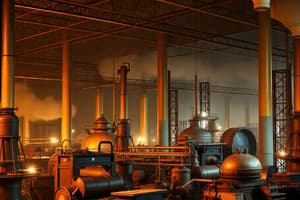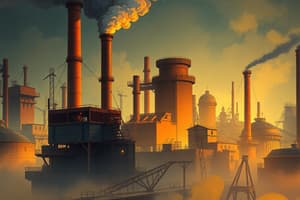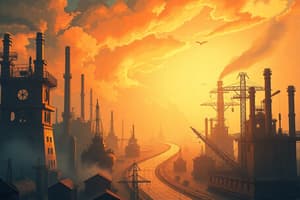Podcast
Questions and Answers
औद्योगिक क्रांतीमुळे ब्रिटेनला कोणत्या स्थितीत पुरस्कृत केलं?
औद्योगिक क्रांतीमुळे ब्रिटेनला कोणत्या स्थितीत पुरस्कृत केलं?
- पाणी, धातू, लोह सोपे
- कोल आणि लोह मात्र (correct)
- कोल, लोह, आणि मुसळ एकत्र
- धातू आणि पाणी केवळ
औद्योगिक क्रांतीचा प्रारंभ कुठल्या शतकात होता?
औद्योगिक क्रांतीचा प्रारंभ कुठल्या शतकात होता?
- 18 व्या (correct)
- 19 व्या
- 20 व्या
- 17 व्या
'ओलिव्हर इव्हन्स' ने कोनत्या संक्रमणाचे सृजन केले?
'ओलिव्हर इव्हन्स' ने कोनत्या संक्रमणाचे सृजन केले?
- स्पिनिंग जेनी
- स्टीम इंजिन
- पॉवर लूम
- रोलर मिल (correct)
'मॅथ्यु Boulton' कोणता 'स्टीम इंजिन' विकसित केला?
'मॅथ्यु Boulton' कोणता 'स्टीम इंजिन' विकसित केला?
'स्टीम इंजिन' कसा परिवहन परिवर्तन केला?
'स्टीम इंजिन' कसा परिवहन परिवर्तन केला?
'सुपर लूम' कोणता 'संक्रमित' केला?
'सुपर लूम' कोणता 'संक्रमित' केला?
काही क्षेत्रात ब्रिटनची अग्रगती कस उत्पन्न केली?
काही क्षेत्रात ब्रिटनची अग्रगती कस उत्पन्न केली?
कितपत गोंधळलं किंवा भ्रष्ट होतं, जो उद्योगक्षेत्रात मिळालं होतं?
कितपत गोंधळलं किंवा भ्रष्ट होतं, जो उद्योगक्षेत्रात मिळालं होतं?
कुठल्या समस्या उद्योगक्षेत्रामध्ये काम करणारे काही कामगार सामर्थ्यही महसूस करत होते?
कुठल्या समस्या उद्योगक्षेत्रामध्ये काम करणारे काही कामगार सामर्थ्यही महसूस करत होते?
सामाजिक अंतर महसूस करून, कुठले सुप्रसिद्ध लेखक महत्त्वपूर्ण काम केले?
सामाजिक अंतर महसूस करून, कुठले सुप्रसिद्ध लेखक महत्त्वपूर्ण काम केले?
Study Notes
The Transformative Era of the Industrial Revolution
The Industrial Revolution, a pivotal moment in history, spanned the late 18th and early 19th centuries, marking a rapid shift from agrarian to industrial societies. This revolution, characterized by innovations in manufacturing, transportation, and communication, had a profound influence on the world that still echoes today.
Origins and Development
The Industrial Revolution began in Great Britain. A combination of factors, including an abundance of coal and iron ore, an extensive waterway network, and a tradition of commercial capitalism, laid the foundations for a dramatic surge in manufacturing and trade.
The period's most important innovations included:
- The steam engine, developed by James Watt and Matthew Boulton, which made transportation more efficient and made it possible to power factories.
- The spinning jenny and later the power loom, designed by James Hargreaves and Samuel Crompton, which allowed factories to produce far greater quantities of cloth than traditional handlooms could.
- The roller mill, created by Oliver Evans, which revolutionized grain production.
These changes, alongside others, led to a spiraling growth in manufacturing, transforming economies and societies with unprecedented speed and scale.
Economic Impact
The Industrial Revolution thrust Britain into the position of the world's leading industrial power. By the early 19th century, Britain's economy had grown to four times its size at the beginning of the century. The standard of living for many Britons improved, as wages rose and consumer goods became cheaper and more accessible.
However, this growth was not universally beneficial. The transition from farming to industrial work left many workers impoverished and forced to live in poor conditions. These challenges were not unique to Britain. As the Industrial Revolution spread to Europe and then North America, it disrupted traditional ways of life and exacerbated social inequalities.
Social and Cultural Impacts
The Industrial Revolution altered the landscape of human life. As villages emptied, their inhabitants moved to growing industrial cities. These urban centers gave birth to new forms of art, literature, and philosophy.
The new urban culture, often characterized by dense populations, pollution, and crime, inspired many authors to explore themes of loss, exploitation, and social injustice. Literary giants such as Charles Dickens, Charlotte Bronte, and William Wordsworth grappled with the challenges of the new industrial age.
Global Influence
The Industrial Revolution served as a catalyst for rapid global change. As Britain's industrial power grew, it spread its influence to other countries, including continental Europe and North America, through trade, migration, and the export of technology and capital.
As other nations industrialized, they began to challenge Britain's dominance. By the late 19th century, the United States, Germany, and Japan had developed their own industrial bases and began to outcompete Britain in various industries.
The Industrial Revolution set the stage for the modern world. Its innovations paved the way for future technological advancements, while its social and economic challenges continue to be relevant in the 21st century. As we study its lessons and legacy, we gain insight into the forces that shape our world today and anticipate the challenges that tomorrow may bring.
Studying That Suits You
Use AI to generate personalized quizzes and flashcards to suit your learning preferences.
Description
Explore the origins, economic impact, social and cultural impacts, and global influence of the Industrial Revolution. Learn about key innovations, economic growth, social inequalities, urbanization, literature, and the spread of industrialization to other countries.




